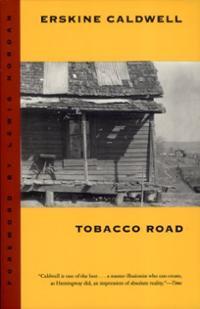Written in 1932 and set during the Great Depression of that time, Erskine Caldwell’s Tobacco Road blesses us with a look into the hearts and minds of white sharecroppers in Georgia. And at a time when there’s little to be happy about due to widespread poverty and starvation the author manages, in this slice of life, an accomplished marriage of dark humour with the bleakness expected from humanity worn down.
The Lesters, headed by patriarch, Jeeter, are one of the families living out on the farmlands around the town of Fuller. What once was rich tobacco land has, over the generations, been sold off to makes ends meet to the point that the Lesters are living at the discretion of an absentee landlord who has sold up and moved to Augusta. All Jeeter wants is to hire a mule, get himself some seed and some guano so that he can grow a bit of cotton and provide for himself and his family. But, with all the sharecroppers in the same predicament, it’s no surprise that stores in Fuller won’t give him any credit. Thus the destitute are further struck down. Even God, it seems, has abandoned them.
The novel follows Jeeter as he hopes and procrastinates over making enough money to live on, stubbornly refusing to leave the land he was born on for the mills where he would no doubt be guaranteed work. When he does try, nobody wants to know. When a plan seems a good one, the optimism surrounding it comes crashing down. And when he thinks he knows the ways of the world, his rural naivete allows advantages to be taken of him. Things proceed, pretty much the same from day to day as you’d expected when there’s nothing much to do, until, like all those passing through Tobacco Road, the novel reaches its tragic end.
The greatest thing about Tobacco Road is its cast of memorable characters. Caldwell’s skill in regularly making Jeeter a man we feel is hard done by and then have us abandoning all sympathies for him ensures that we never really know what to make of him, although, come the conclusion, we can look back over his actions and see him for who he is. Around him, the others play out parts both harrowing and darkly comic: his wife, Ada; his last remaining kids, Dude and hare-lipped Ellie May; his mother who “had lived so long in the house…she had been considered nothing more than a door-jamb or a length of wearther-boarding”; Lov Bensey from two miles over, married to the Lesters’ twelve year old daughter, Pearl; and Sister Bessie, a widowed preacher-woman who follows directions from God on her actions.
Caldwell’s narration, always to the point, feels evocative of the geography – at least, idealistically – and complements the wonderfully captured nuances of the local dialect, with the bleak realities of everyday life shot through with humour that, when thought about, becomes all too plausible and not funny after all:
The Lesters stood around in the yard and on the front porch waiting to see what Lov was going to do next. There had been very little in the house again that day to eat; some salty soup Ada had made by boiling several fatback rinds in a pan of water, and corn bread, was all there was when they had sat down to eat. There had not been enough to go around even then, and the old grandmother had been shoved out of the kitchen when she tried to come inside.
At under two hundred pages, Tobacco Road is a quick enough read, thin on plot, shifting its focus to its characters and their interactions, but remaining satisfying as events unfold. Even though the characters aren’t truly likeable, you still want to know what they are going to do next and that sort of readability ensures a skilled hand from the author, something Caldwell surely has. It isn’t going to be challenging Steinbeck’s The Grapes Of Wrath for Best Depression Novel Ever, but Tobacco Road is a road worth walking, certainly worth the price of a mule, some seed, and guano at least.

Interesting that you liked it more than I did, I found the characters too dehumanised ultimately, I thought Caldwell rather robbed them of their dignity. I’m glad you found it more rewarding.